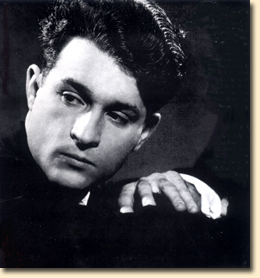

William Kapell, whose brilliant career as a pianist who actively promoted contemporary American music was limited to only a 31-year existence on earth, was a profound thinker.
During his final tour in Australia in 1953 which lasted three months and was taken up with thirty-seven concerts in fourteen weeks, he wrote this in a letter to his friend, pianist Shirley Rhoads:
I think greatness in art is something you come upon after only yearning and pain, and a deep sense of being in a dark tunnel. Greatness in art is not something you tell yourself you have. It is an oasis, the greatness, the vision, or whatever you want to call it, after travelling the vast desert of lonely and parched feelings. After this, the oasis. And the older a musician gets who has once seen the oasis, the more he wants to live there all the time, so the more frequent are his attainments of greatness and vision.
Born in 1922 on the Upper East Side of New York City to parents of Spanish, Russian and Polish descent, William Kapell showed an early interest and promise in Music, and the piano in particular. His first teacher was Dorothea Anderson LaFollette. Six weeks after taking his first lesson, the young protégé won a contest open to children studying in the city's settlement schools (the prize was a turkey dinner as a guest of Jose Iturbi).
By 1934 he was playing recitals in private homes and small concert venues. During his senior year at Columbia Grammar Scholl, Kapell was awarded a scholarship to study at the Philadelphia Conservatory of Music under Mme. Olga Samaroff. After a little more than a year there, he won the Youth Contest sponsored by the Philadelphia Orchestra, which resulted in a February 1940 appearance with the orchestra in the Saint-Saens G Minor Concerto.
The same year, he was awarded a fellowship to the Juilliard Graduate School, where he continued to study with Mme. Samaroff; he entered and won the Walter W. Naumburg debut in October 1941. The following February an additional honor came his way: the Town Hall Endowment Series Award, provided for an artist under 30 years of age who had presented the outstanding performance at the hall in the previous year. (Kapell, at 19, was the youngest ever to be so honored.)
His career was fully launched in the summer of 1942, when Efrem Kurtz engaged him to play the new Khatchaturian Concerto with the New York Philharmonic at Lewisohn Stadium. He subsequently became known to some colleagues as "William Khatchaturian Kapell" for the frequency with which he played the piece. He also began his concert tours in 1942; in 1944 the Philadelphia Orchestra signed him to an unprecedented three-year contract; in 1945 he toured Australia; 1946, South America; 1947, Europe. Although in these early years he was best known for his performances of the difficult late-19th century virtuoso repertoire for the piano, in fact, those who followed his career closely remarked upon the enormous breadth of his repertoire, mindedly devoted to excellence and truth in his music-making, and worked with the tremendous vigor that characterized his personality to continually learn and improve.
Kapell had a strong interest in the music of his own time, and was particularly devoted to Aaron Copland's piano works. As the composer remarked, Kapell often chose thorny, difficult works to perform rather than more obvious crowd-pleasers. Works by American composers were featured in all of his concerts abroad, for he felt a certain sense of mission in bringing these compositions to audiences around the world.
William Kapell was returning from a tour of Australia on October 29, 1953, when his plane crashed upon landing in San Francisco. He was one of the 19 passengers who perished in the fiery wreck, leaving behind a legacy of artistry and commitment vividly recalled by those who had contact with him and with his work. He was only 31 when he died.
Here is an example of the poetic way in which he played the music of Frederic Chopin. This is the Nocturne in E-flat, Op. 55, No. 2 recorded in Australia a few months before his death. Listen!
Please visit the William Kapell Piano Foundation.
If you need to leave, Go to initial page of site.
If you are interested in advertising a music-related business in the pages of the classroom, please send us an e-mail regarding rates by clicking here.